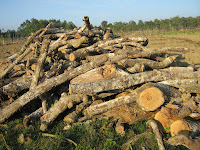 |
| Fuel wood |
Bangladesh forests are surviving under high level
of demographic stress. The production from forest areas is continuously
declining and most of it is consumed within the country, and a large quantity
is imported to satisfy domestic consumption. The continual change in species
and age group, and lowering of average age of forests is adversely affecting
the sustainability of the current forest ecosystems. Therefore, production of
timber and fuel wood from forest areas have fallen by more than 50% after the
felling ban in 1988-89. However, the actual production after including private
sources is much higher and is estimated at 7.9 million m3 of round wood of all
kinds, and 656 million bamboos. The wood is primarily used for meeting needs of
fuel wood, sawn timber, poles, pulpwood and other products in Bangladesh.
Fuel
wood is the main forest product (61% of total round wood) in Bangladesh. The
country annually requires about 9.4 million m3 of fuel wood against supply of
about 6.18 million m3 whereas share of domestic 70% (like cooking), industrial
28% (like brick burning), and commercial 2% (like bakeries and restaurants) use
of the total fuel wood consumption in the country. The consumption is expected
to raise 11.9 million m3 by 2015. The majority of the fuel wood supply comes
from the village groves.
The annual requirement of sawn timber in
Bangladesh is expected to rise from 5.4 million m3 (round) in 2000 to 6.8
million m3 (round) in 2015. The sawn wood production is expected to increase
from current estimated level of 1.45 million m3 (round) in 2000 to the
estimated level of 1.9 million m3 (round) in 2015.
Bangladesh is now heavily dependent on imports of
forest and forest-based products for meeting its basic consumption. A huge
trade deficit exists in the forest products. Primary imports of logs and sawn
timbers are from countries like United States, Canada, Australia, Myanmar,
Singapore and Malaysia. The Government of Bangladesh tries to contain import of
forest products through imposition of duty and restriction on imports.
No comments:
Post a Comment